Public sector cuts limit services sector to slowest growth in a year, services PMI survey shows

With the bulk of cuts still to come, businesses are already reporting a blow from cancelled public sector contracts. Services companies, which range from hotels to banks, saw activity rise at the slowest pace since they emerged from recession a year ago, according to the Markit/CIPS UK services purchasing managers' index (PMI).
As demand for new work stalled amid uncertainty over the economic and spending outlook, the headline index dropped to 53.1 in July – the lowest since June 2009. It was still above the 50-mark, dividing expansion from contraction, but was below forecasts for it to hold at this June's level of 54.4 in a Reuters poll of economists. Experts said the slowdown in the economy's biggest sector bolstered expectations that overall growth will slow in the second half after a surprise burst of activity between April and June.
"The service sector provided a major boost to GDP in the second quarter, but the rate of expansion has slowed sharply in recent months, suggesting a far weaker contribution to economic growth in the second half of the year," said Paul Smith, senior economist at survey compiler Markit.
New business also grew at the slowest pace for 13 months and there was worrying news on employment.
"Disappointingly, the survey also shows that service providers are cutting payroll numbers, suggesting that private sector employers are unlikely to compensate for public sector staffing cutbacks and therefore implying that unemployment may begin to rise again," said Smith.
"Behind the weaker growth profile for the service sector is a failure of confidence to rebound from the record fall seen in the aftermath of the emergency budget. Expectations about prospects for the coming year appear to have down-shifted in response to the austerity measures announced in June, with reports of cancelled contracts and reduced enquiries adding to the sense that tough times lie ahead."
The slowdown in services sector growth follows similar survey readings this week on both manufacturing and construction and bolsters economists' views that a jump to 1.1% growth in second-quarter GDP was a blip and set to be followed by subdued growth and maybe even a double-dip recession as cuts bite.
The pound fell against the dollar after the survey raised traders' concerns over the fragile nature of the UK's economic recovery and led them to raise bets that interest rates will remain at their record low of 0.5% for many months to come.
"The surveys suggest that when it comes to third-quarter GDP, the economy is likely to struggle to expand by even half the 1.1% quarterly pace that was recorded during the second quarter," said Alan Clarke, economist at BNP Paribas.
David Noble, chief executive at survey co-authors the Chartered Institute of Purchasing and Supply said it was worrying to see the measures in George Osborne's austerity budget were being felt so soon.
"This month's services PMI will undoubtedly raise questions about whether the economic recovery is running out of steam. To see government spending cuts impact the sector so quickly is concerning given the bulk of cuts are still yet to come. The big question is whether the private sector can plug the big gaps left by the public purse," he said.
"The fall in employment is particularly disappointing and shows how quickly businesses will respond to worsening economic conditions – let's hope this isn't a trend we'll see continue."
Source

